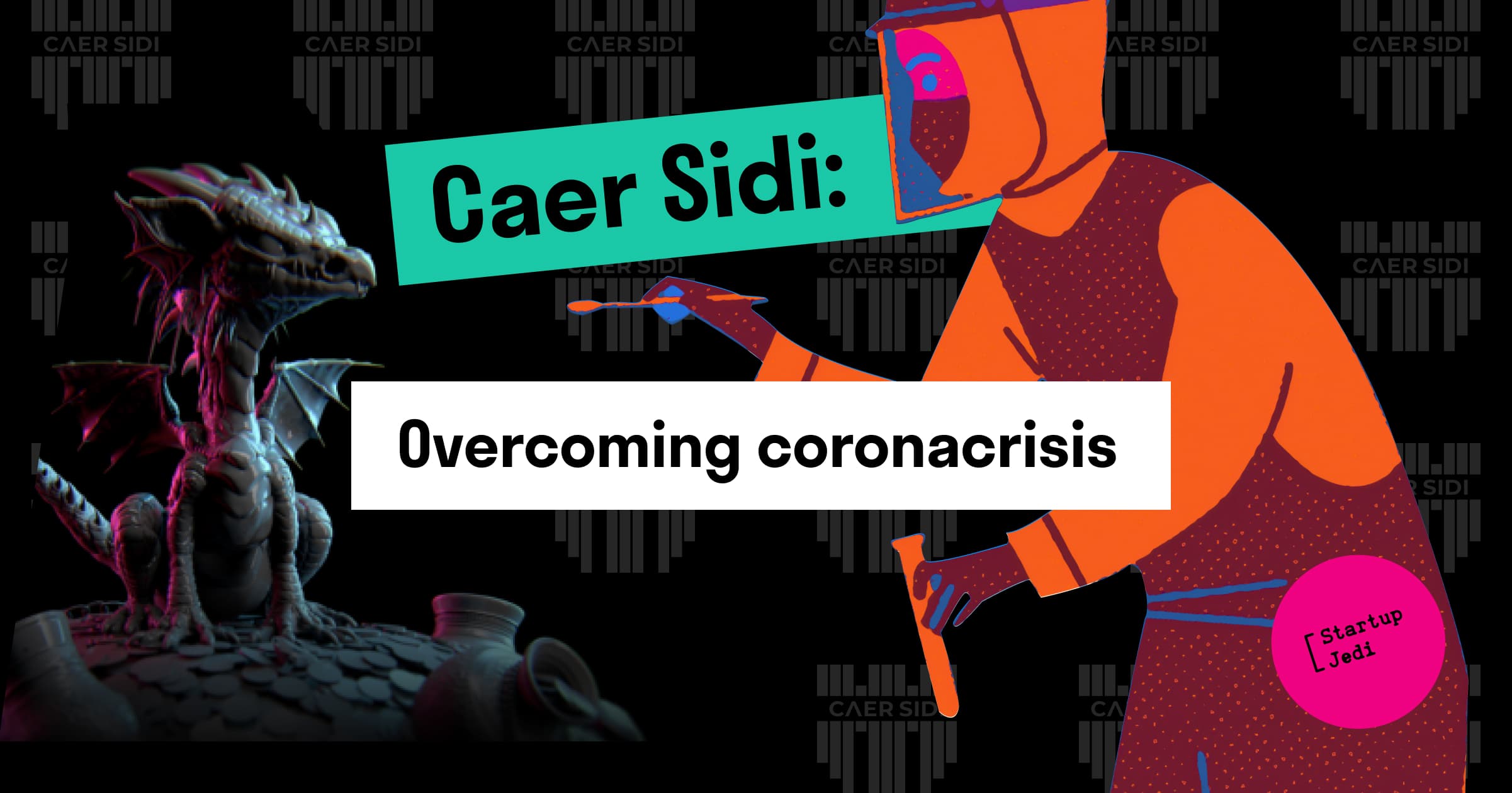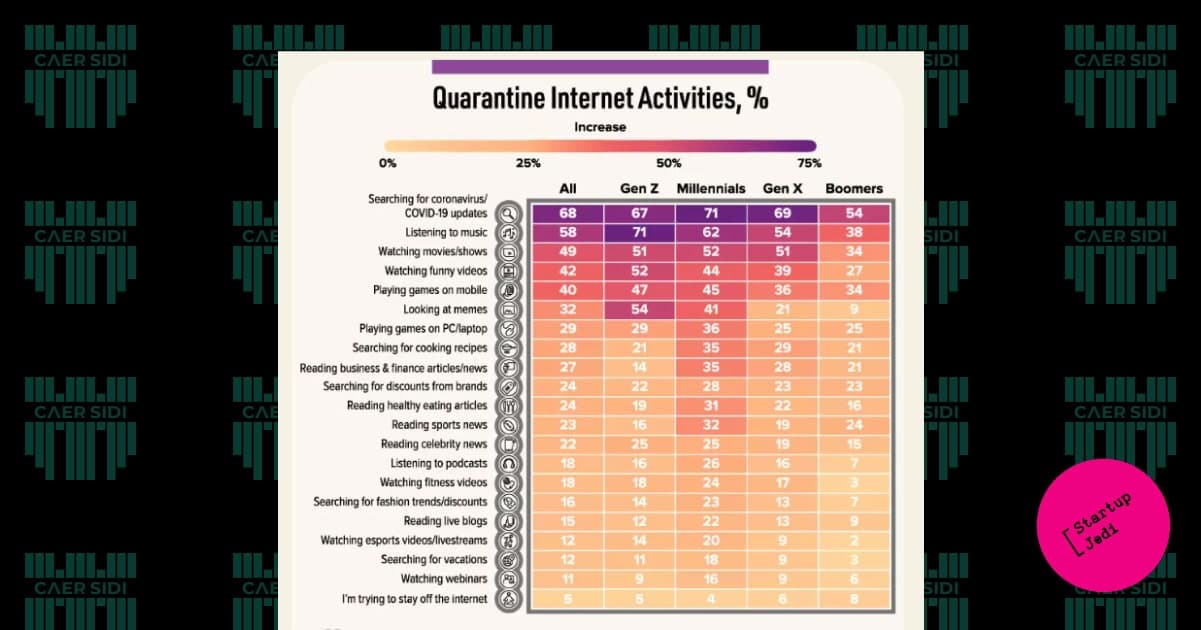
Startup Jedi
We talk to startups and investors, you get the value.
Startup always means minimum guarantees and certainty even in calm and stable times. It is obvious that such projects get “stormed” during the crisis, even when companies with safety margin are closing. In this context, it is interesting to look at the experience of Belarusian-Ukrainian startup Caer Sidi. The founders did not only manage to keep the project afloat but were also able to reconsider the sales strategy and signed new contracts right away, in the time of total quarantine. Pavel Shlapak, startups’ CEO, tells how they have succeeded in doing so.
Caer Sidi is the first successful project that has gone through the cycle of Rocket DAO ecosystem and has already attracted investments.

Startup Jedi
We talk to startups and investors, you get the value.
It is a B2B software solution that accelerates sales growth and assists in solving marketing tasks more effectively. Caer Sidi is bringing new positioning and experience to entertainment products.
We are doing this by creating unique “digital twins” that are connected to physical objects by NFC-chips. By reading such a chip with a smartphone, you are activating the content online: artefacts in games, digital copies of art objects in catalogues, loyalty cards and even more. This chip can’t be faked or hacked. The technology can be implemented in any field where online and offline should be merged.
Caer Sidi comprises physical and digital values in fidgital merch 2.0.
You can find more details about the project in our article.
...
A few months ago, down to the middle of March, we were negotiating with big clients to start as powerful as possible. There are preliminary agreements with Winstrike Team (big e-support operator from Russia), WePlay! Esports (a studio and a tournament platform from Ukraine that produces exclusive merch for Fortnite, Mortal Combat and etc.). There is a mutual interest from other companies — organisers of cybersport tournaments and merch producers.
Unfortunately, the crisis has brought its own corrections to the plan. Hopefully, temporary. All big companies paused their activities for an uncertain period. They do not refuse to negotiate, confirm their interest, however, they do not sign any new agreements. Not only with us — with everyone.
We continued the fundraising process and right before the crisis, we were on the stage of hard commitment with one of the investment companies and business angels from Belarus. Nevertheless, this is where we also had to stop for a while.
...

1. We changed the sales strategy
We re-orientated on clients with smaller business scales and we’re now working with them directly. For example, if we were communicating influencers through agencies, then now we’re contacting them directly. It is easier and faster to agree on conditions and start working with small and medium-sized companies.
2. We cut the burn rate in 5 time
Now, all our expenses are targeted and aimed at specific projects. We invest our time and money in a deal only if there is a contract, payment or strong interest from the client’s side. In fact, we returned to the classical startup strategy, where you spend less money and you still have sales and organic growth. Quite possibly, that it won’t be as fast as it could have been but in current situation and conditions, it is the way it should be.
3. We systematize sales
Up until recently, we were selling through personal contacts and event networking. Now, we can see that we have grown up to a standard sales department, we can work with scripts and contacts’ databases. In addition, there are many great managers on the market, who are ready to sell innovative products for the percent from their concluded deal. We are recruiting people and discussing the launch.
4. We add large companies to the funnel
Those who aren’t ready for action but those who can preliminary value collaborative prospects. In this regard, the crisis works for us to some extent. And vice-versa, somebody is being pushed by the situation. According to some metrics, digital entertainment is now growing by 40%: people are spending more time at home and entertaining online. This trend will last for some time as all transport restrictions and people’s anxiety won’t be fast to pass.

...
Currently, our focus is on the merch market for bloggers. Target audience is channels where each video gets 1 million views on average. However, keeping in mind the crisis and clients’ requests from different fields, we decided to expand our audience and test a number of hypotheses. We are ready to cooperate with new projects in case it brings us revenue, the client is willing to invest in the work and the work itself does not involve any additional expenses from our side.
If games can produce their own merch, then a blogger can do the same. We have already started T-shirt production with Brick Fantasy YouTube channel that makes reviews and cartoons about Lego. Its audience reacted quite rapidly: there are 5,2 thousand likes and more than 700 comments under the post. The work on the store and the start of sales is in full swing.
PixEOS is an art platform that operates on EOSIO blockchain. It digitalises physical and virtual art objects. The idea is that authors of physical objects all around the world will be able to create e-versions of their work and receive a secured authenticity certificate. We are talking about various paintings, sculptures, interior objects, antiques and just rare things.
In the case of offline-objects, the sticker with NFC chip is glued directly on the object, its frame or base. It is synchronised with pixEOS catalogue. Having brought a smartphone close to it, a person can find out more about the object: creation history, interesting facts, a message from the author. Another interesting option how to use this technology is at art schools, extracurricular classes or even at home. In this way, it is possible to save the art objects to see skill growth over time. Moreover, gamification elements for quests, giveaways, etc. can be well-integrated in the technology. The sticker cannot be forged; when attempted to unstick from the object, the NFS chip automatically destroys itself.
Surprisingly, it is a client from the HoReCa field in Belarus.
They are doing a great job looking for different options on how to survive the crisis. We offered them an interesting product — personalised interactive loyalty cards.
During the crisis, everything related to entertainment is suffering, including cafes and restaurants. For the first time, our client tried itself in the field of delivery and is looking for opportunities to stand out among other establishments and to be closer to the client. This is relevant because a lot of cafes have noted new realia and started delivering their products around the city.
The loyalty card that we developed has a page on the website: there a person can see the purchase history, receive push-notifications regarding promotions or giveaways. To do so, just touch the card with the phone. Our client receives a set of marketing tools instead of just a simple loyalty card. Its clients, in their turn, get more advantageous offers.
From a technical point of view, it is a similar case. We are talking about plastic business cards, upon contact with which a page with relevant data is opened on the phone — in one click they are saved in the smartphone’s contact book. In the long run, it may have two profiles for different tasks. If the information changes, it is enough just to add the changes on the page. There is no need to create a new card.
...

1. If reality changes, adapt as fast as possible. The sooner you change your strategy, marketing philosophy, conditions for clients, the better. Any crisis brings new possibilities: try to see such possibilities in your niche.
2. Pay attention to related fields. Don’t dive in a completely new field — most likely, that you should somehow change your current offer. To broaden the audience, to adapt the product, to offer new services and etc.
3. Try to save the team. It is vital for a startup, even more than for a classic business. Take into account new reality and look for options on how to keep the key employees, even with radical cost-saving. Most likely, that working processes will change too, so adapt.
4. Be open to new possibilities outside your niche. These days, the majority of companies understand that they have to work differently to survive. Therefore, in a crisis, you can find and create such options that you could not even dream about before. This is not only about customers but also about suppliers, companies from related industries and even competitors.
Facebook: facebook.com/StartupJedi/
Telegram: t.me/Startup_Jedi
Twitter: twitter.com/startup_jedi
Comments